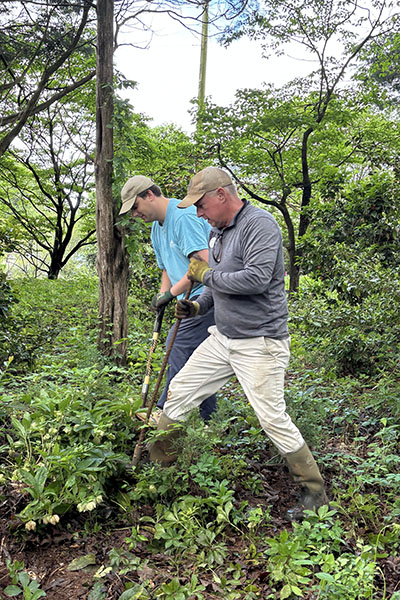July 18, 2025
from the Record, Spring 2025
SOIL AND WATER
Huntsville Botanical Garden
After 17 years as the natural resources planner at the Weeks Bay National Estuarine Research Reserve in Fairhope, Alabama, Mike Shelton ’86 has planted his feet firmly back on the ground as the natural areas supervisor for the Huntsville Botanical Garden in Huntsville, Alabama.
A far cry from the path as an attorney he envisioned when he matriculated at Hampden-Sydney, Shelton’s start in environmental sciences came while working at an Environmental Protection Agency (EPA) lab, where he participated in groundbreaking work in bioremediation of the Exxon Valdez oil spill. Shelton and his colleagues used fertilizers to enhance the growth of indigenous microorganisms that in turn used the hydrocarbons in the oil for food, thus removing it from the landscape.
“What I like to think that I have done with my career is maximize the finite resources that we have on our planet,” Shelton says. “Nothing goes on forever, but we all benefit from a healthy environment, and we’re all negatively affected when the environment is degraded.”
From cleaning up devastating oil spills to providing healthy habitats for the small, but mighty bumblebee, the conservation of planetary resources remains Shelton’s north star and his advice for budding conservationists.
“Working in the environmental sciences offers some really big successes, a bunch of little successes, and of course some disappointing failures,” Shelton says. “If you hold tight to the goal of saving one tiny fraction of the world, though, you won’t be disappointed for long.”
Crediting legendary Professor of Biology Ed Crawford with inspiring his shift in interest from law to science, Shelton remembers Dr. Crawford saying, in a History of Biology class, that the giants of biological sciences were “able to see what they were looking at.” “I knew I wanted to be able to see what I was looking at also,” Shelton reminisces. After nearly 40 years in the field, Shelton has cultivated that same clarity of vision in others, from participating in groundbreaking microbiology to educating citizens on how to help pollinators by planting native species. Rooted in a passion sparked decades ago, Shelton continues to inspire and protect—one pollinator, one plant, and one piece of the planet at a time.


